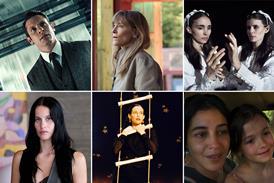Dir: Alexei Guerman Jr.Russ. 2005. 118mins.
With its stunnisngphotography, interminable takes, abstract narrative and metaphoric ambitions,Alexei Guerman Jr sophomore effort Garpastum cannot fail to become acritics' favourite and a must-book for any self-respecting film festival. Thatit left Venice - where it competed - without any distinction reflects more onthe juries than the film itself, which plays out like a visionary explorationof Russia's past.
At best an obscure,whimsical version of Bertolucci's Before The Revolution - only set in aSt Petersburg that is largely unrecognisable - it pretends to deal with twobrothers who laid the foundations for football in Russia (garpastum is anancient name for ball games). But there is no likelihood that this will attractthe same audiences drawn to more multiplex-friendly features like Goal!or Green Street Hooligans.
As such it is the kind offeature that few will see but many professional publications will discuss.Commercial prospects are difficult at best.
It is the eve of World WarOne, somewhere on the industrial outskirts of St Petersburg. Two brothers,Andrei (Pronin) and Nikolai (Kozlovsky), still in their teens, live with theiruncle, a doctor (the late Pavel Romanov, seen in Guerman Jr's The Last Train).
Their father went mad afterlosing all his money, betting it on the Russian football team which wasthoroughly defeated by Germany two years earlier. Their mother dies soon after,and the brothers, who have inherited their father's infatuation with the game,try to join one of the teams in town.
When they are turned down,they decide, with a couple of friends, Fatso (Bykovsky) and Shoust (Vladimirov)to start their own club. But to do so they have to raise funds for a pitch -and so start hiring themselves out to whoever will pay.
The above suggests a linearplot - but it is the last thing Guerman Jr has in mind, as he inter-cuts thisseemingly straightforward narrative with a coming-of-age story and the portraitof a world about to disappear forever.
One of the brothers enjoysan affair with an older woman, Anitsa (Khamatova), an exiled Serbian actresswhose salon is graced by artists like Blok, Mandelstam and Akhmatova, all ofwhom will celebrated in the not-too-distant future.
Through this salon comes asense of the bohemian life and the literary and political winds blowing throughRussia at the time. The murder of Archduke Ferdinand in Sarajevo, which ignitedWorld War One, is introduced early on as an essential component of the period,although the war itself never invades the screen.
More visible is the turf warbetween gangsters to grab territories from each other, a conflict which is toentangle the friends with tragic consequences. One is also drafted into thearmy; an epilogue shows him returning to St Petersburg in 1918 to kick a ballaround - but the world around him doesn't look the same any more.
Garpastum seems loath toreveal its secrets, showing events that do not always connect and characterswhose back story we have to fill in: this is a feature where audiences shouldbe prepared to work for their enjoyment.
At times too much is missedout: the October Revolution, the most momentous event in Russia at the time,goes strangely unmentioned, possibly because Guerman wants this portrait of apast world to resonate with the present as much as possible and not become toodiverted.
Other themes do however seemas relevant today as they were then, including the obsession with sports,dubious sources of income, lack of interest in international events that do nothave an immediate impact on the protagonist and the doomsday prophecies ofartists that no one listens to.
While all four youngsters -Pronin, Kozlovsky, Bykovsky and Valdimirov - fit the bill nicely, it is PavelRomanov, who died soon after the end of the shoot, who proves best attuned toGuerman's needs.
There is also theastonishing beauty of Oleg Lukichov's widescreen photography, essentiallymonochrome with patches of colour and with the sort of long, elegant takesGuerman Jr showed such fondness for in The Last Train.
Editing is less relevant,with the emphasis more on actors having a powerful enough screen presence tocompensate for the lack of information about their characters. To this end theyare aided by Igor Vdovin's score and the imposing sets of Rakutov andKropachev, all helping help create a film that is more art object thanmass-audience entertainment.
Production company
VK Kampaniya
International sales
Intercinema XXI Century
Executive producers
Anton Malyshev
Producers
Alexander Vaynshteyn
Screenplay
Oleg Antonov
Alexander Vaynshteyn
Cinematography
Oleg Lukichov
Editor
Ivan Lebedev
Production design
Sergei Rakutov
Georgy Kropachev
Music
Igor Vdovin
Main cast
Evgeny Pronin
Danila Kozlovsky
Dmitry Valdimirov
Alexander Bykovsky
Chulpan Khamatova
Iamze Sukhitashvili
Pavel Romanov
Olga Samoshina
Gosha Kutsenko
Leonid Mozgovoy



















No comments yet